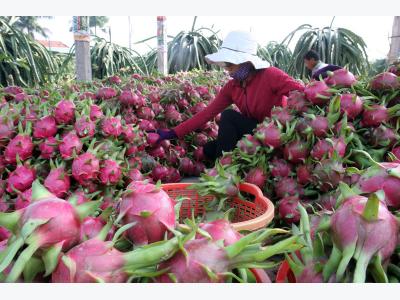Vietnamese efforts in Japan bear fruit

After years of efforts and negotiations, Vietnam was recently licensed to export to Japan three kinds of fruit: mango, banana, and dragon fruit. The opening of this discerning and strict market to Vietnamese fruit is expected to provide opportunities in other markets worldwide.
In mid-January, the Vietnam Fruit and Vegetable Association announced that Japanese supermarkets would be allowed to import fresh Vietnamese dragon fruit. Prior to that, in September 2016, Vietnamese bananas were licensed to be sold in AEON - a leading supermarket chain in Japan.
It took Vietnam nearly 10 years to negotiate for each kind of fruit to enter the Japanese market with its strict requirements in terms of food safety and quality. The breakthrough was the result of Vietnam’s progress in post-harvest technology, for example the use of steam technology to prevent mango borers.
According to the Vietnamese Trade Office in Japan, the Japanese market offers significant potential for the penetration of Vietnamese fruit because local agricultural production only meets about 50 percent of domestic market demand. Moreover, agricultural lands in the Land of the Rising Sun are decreasing and import demand is expected to grow. Exports to Japan currently account for a mere 3.1 percent of the total export value of Vietnamese fruit (about US$700 million per year), but are expected to grow rapidly.
However, Japan imposes very tight controls on imported products, presenting a challenge for bringing fresh fruit into this market and maintaining market share.
Vietnamese bananas are currently sold in six supermarket and retail shop chains in Japan. This, too, was only achieved after great efforts. Japanese importers visited Vietnamese banana gardens to taste the fruit and see how it’s grown. Vietnamese banana exporters had to invite foreign experts to help them apply modern packaging technology in order to meet the requirements of the Japanese importers. It took them seven to eight months to learn the technology.
Nguyen Trung Dung, Minister Counselor at the Vietnamese Trade Office in Japan, said ensuring the stable quality of Vietnamese fruit is crucial to maintaining their market share in Japan. Some Vietnamese companies have cooperated with Japanese businesses to build safe supply chains. This is a good strategy as Japanese businesses are knowledgeable about various technical barriers and can advise the Vietnamese how to deal with them. Negotiations are under way to obtain the Japanese government’s permission for Vietnamese litchis and star apples to enter this market in the near future.
It is hoped that successful penetration into the difficult-to-please Japanese market will pave the way for Vietnamese fruit to be exported to other developed countries, such as the US and Europe
Related news
 Processed chicken exports promoted
Processed chicken exports promoted According to the plan of the Ministry of Agriculture and Rural Development, in 2017, there will be at least one certified enterprise which is eligible to export
 Workshop looks to promote clean production in rice value chain
Workshop looks to promote clean production in rice value chain Agriculture sector insiders put forth solutions to improve the entire rice value chain towards clean production, especially in the Mekong Delta, at a workshop
 Price fluctuations trouble for farmers in Đồng Nai
Price fluctuations trouble for farmers in Đồng Nai Fluctuations in the price of farm produce, due to a lack of long-term production planning and sustainable markets, are causing problems for many farmers in Đồng